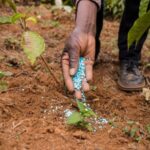Japanese automotive giant Toyota Motor Corporation has shown interest in supporting Indonesia’s 10-percent ethanol fuel blend (E10) initiative by investing in bioethanol production, an Indonesian official confirmed.
In a statement on Monday, Deputy Minister of Investment and Downstreaming Todotua Pasaribu said Indonesia’s annual fuel consumption surpasses 40 million kiloliters, with an estimated 4 million kiloliters of bioethanol required to implement the E10 policy by 2027, reported Anatara News.
“To make the most of this opportunity, Indonesia needs to start preparing the necessary facilities now. This is the moment Toyota wants to take advantage of,” Pasaribu said, noting that the automaker already produces bioethanol-compatible vehicles for multiple markets.
The investment opportunity was discussed during Pasaribu’s meeting with Toyota Motor Asia Regional CEO Masahiko Maeda on November 7.
According to Pasaribu, the plan supports President Prabowo Subianto’s directives to pursue energy self-sufficiency, develop a green economy, and increase the value-added potential of natural resources through downstreaming.
“We see great potential to collaborate with Toyota in establishing Indonesia as a regional hub for bioethanol production,” he stated.
Pasaribu also shared details of his visit to the Research Association of Biomass Innovation for Next Generation Automobile Fuels (RABIT) facility in Fukushima, where Toyota and RABIT are advancing second-generation bioethanol made from non-food biomass.
“RABIT’s technology can transform a variety of agricultural waste materials into bioethanol,” he said, underscoring Indonesia’s abundant supply of feedstock resources.
He further mentioned that Toyota plans to conduct a joint on-site study with state-owned energy company Pertamina in Lampung, which the government envisions as a future bioethanol production hub. “The goal is to establish a joint venture by 2026,” Pasaribu added.
The proposed plan includes developing a bioethanol production facility with a capacity of 60,000 kiloliters per year, backed by an investment of Rp2.5 trillion (around US$150 million) to support the E10 program.
Pasaribu expressed optimism that the investment would not only help meet Indonesia’s domestic bioethanol needs but also create new export opportunities.
















